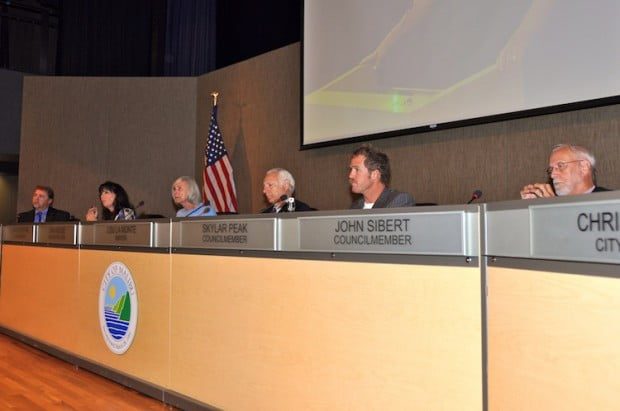
At an exhaustive meeting Tuesday evening that drew more than 100 attendees, the Malibu City Council inched closer to a formula retail ordinance that would require city approval of new chain stores in the Civic Center area.
In a 3-2 vote, council members directed planning department staff to draft an ordinance that would legally require chain store owners to obtain a conditional use permit from the city in order to open a franchise in any Civic Center shopping center that exceeds 10,000 square feet. Mayor Lou La Monte and Mayor Pro Tem Joan House cast dissenting votes.
The next step is a town hall meeting, at which the community is invited to give input into the new ordinance. The planning department would then draft the ordinance, which would need to be approved by the Planning Commission, City Council and finally the California Coastal Commission.
The council’s discussion had been highly anticipated by locals and commercial property owners alike after three local restaurants announced they would close in recent weeks—Point Pizza and Savory at Point Dume Village, and Guido’s Italian Restaurant at Malibu Village.
Backers of such a retail ordinance for Malibu believe the city’s character and uniqueness will lose its luster if chain businesses continue renting up vacant spaces in shopping centers. They also fear shopping center landlords hiking rent prices and making it hard for small business owners to afford leases in Malibu. Opponents of the ordinance, however, believe such an order would impede upon the free market and possibly violate the federal Constitution.
“I’d like to preserve [Malibu] the way it is, but I don’t want to do it at the expense of the free enterprise system, private property rights and taking on the legal minefield of attacking the U.S. constitution and state law,” La Monte said.
Councilwoman Laura Rosenthal was the first to float out the idea of an ordinance for shopping centers in the Civic Center. She limited it to the Civic Center to get what she called a “small start” on what could become a more far-reaching ordinance.
“Asking for a CUP for formula retail is not outrageous,” Rosenthal said. “It’s not saying that they’re not gonna be able to come in…but we want to be able to preserve what our Civic Center looks like now.”
She said the Civic Center is a central hub for the city and where tourists often stop in. The ordinance would exclude grocery and drug stores, banks, real estate offices and gas stations.
The council heard two hours of public testimony from impassioned community members, local business owners, shopping center landlords and other local stakeholders. The community activist group Preserve Malibu, which has been a strong force in pushing the council to consider a retail ordinance, was backed by a number of preservationists imploring the council to get an ordinance passed.
“This needs a real-world fix,” Brian Eamer told the council. “We’re not going away.”
Jo Giese argued that a small faction of the Malibu community was making a lot of noise to garner unnecessary time and labor from the city.
“It’s troublesome to me that I live in a community where sometimes it seems that some individuals who make the most racket can commandeer so much of the government’s attention and resources,” she said.
Howdy Kabrins, the owner of Howdy’s Taqueria at the Malibu Country Mart, spoke out against an ordinance. He said that since Chipotle opened in Malibu Village, he’s had to learn to deal with the competition and make sure his landlord—Michael Koss—does not lose faith in Howdy’s.
“I can’t do this without the support of my landlord,” Kabrins said. “He’s my partner.”
He told the council that small business owners throughout Malibu should work on strengthening relationships with landlords and not look to a city ordinance as a solution.
Passing and implementing the ordinance would require approval from the Coastal Commission, a legislative step which members of the council seemed to dread.
“Is there a way that we wouldn’t have to go to Coastal…so that it doesn’t take forever and a day?” Rosenthal asked Planning Director Joyce Parker-Bozylinski and Associate Planner Joseph Smith.
Parker-Bozylinski and Smith said it would be difficult to avoid going through the commission, as any change to municipal coding fall would under its jurisdiction.
The formula retail option was chosen over an alternate proposal for a commercial diversification ordinance, which would have required landlords to lease a certain amount of their tenant space to “community-serving” businesses. The council felt “community-serving” was too vague, and that there was not enough legal precedence or case law for commercial diversification ordinances nationwide. They directed staff to come back with a better definition of “community-serving.”
